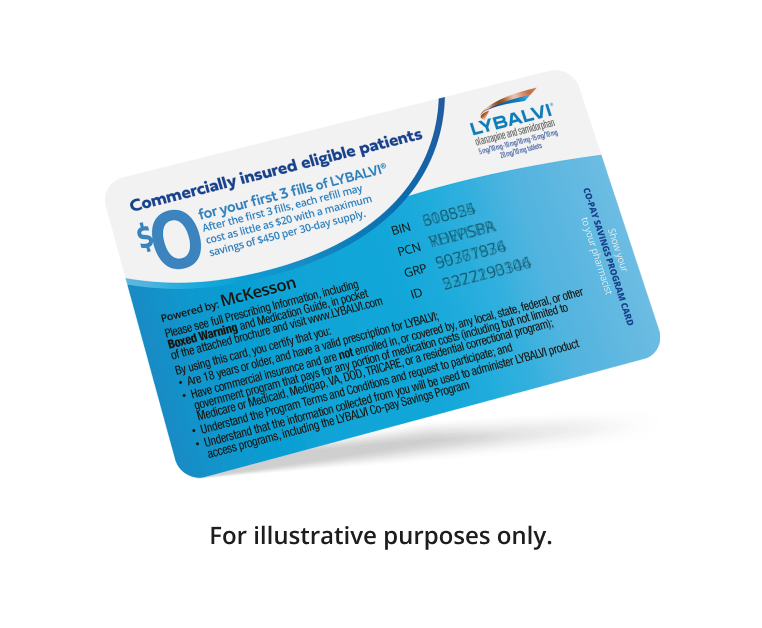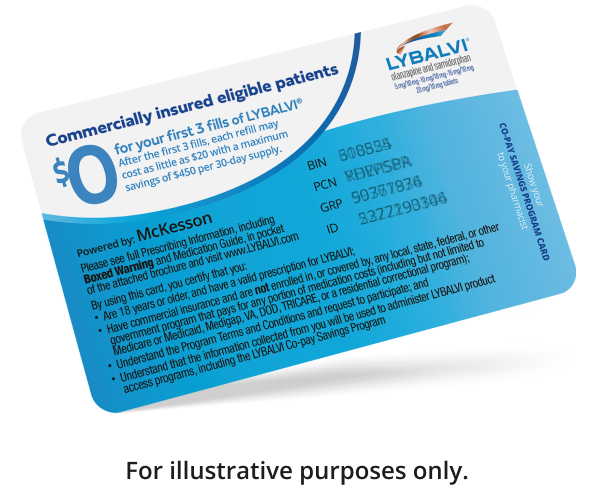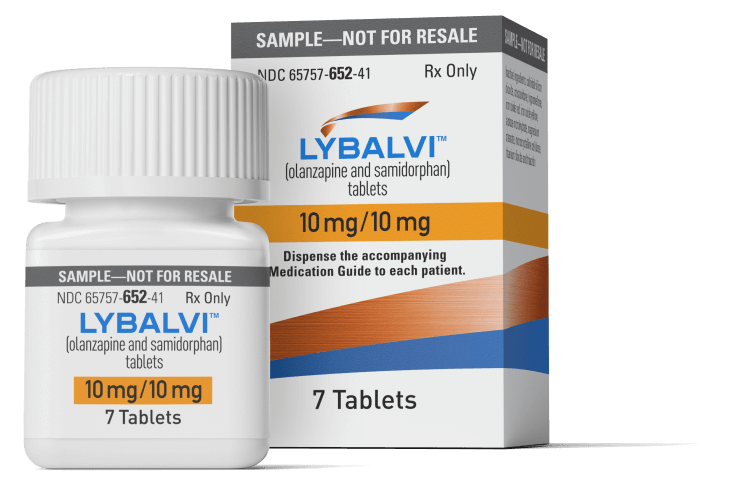support & resources
Support & Savings
for
patients
Broad coverage and access support
LYBALVI is covered for more than 80% of patientsa
aNationally, either with no restrictions or with prior authorization/step edits. Based on LYBALVI national coverage, all beneficiaries, rolling 6 months, through August 3, 2023.
Prior authorizations are commonly obtained for LYBALVI through CoverMyMeds
bData shown is based on CoverMyMeds LYBALVI data from October 2022 through October 2023.
Data is not representative of all prior authorization submissions. Prior authorization through CoverMyMeds is not a guarantee of approval.
Prior authorization support for LYBALVI is available through CoverMyMeds
-
CoverMyMeds is a third-party platform external to Alkermes
-
Supports the prior authorization process online with plan-specific forms and information
-
Healthcare provider offices can quickly find and submit a prior authorization via the healthcare provider portal or via certain EHR platforms
-
Pharmacists can also send a prior authorization request to your office for you to complete and submit
-
Health plans can provide determinations via the CoverMyMeds portal to both your office and the local pharmacy
-
CoverMyMeds live agents can help you navigate the appeal process by providing health plan-specific appeal forms for you to complete and return to the plan, in the event coverage is denied
-
Available at no cost to your office
-
For questions, call 1-866-452-5017 or visit www.covermymeds.com for more information
Additional prior authorization & appeals assistance
Checklist for Letters of Medical Necessity and Appeals
Provided to help facilitate communications with health insurance companies to support a prior authorization, a formulary exception request, a medical exception, or an appeal of a denied claim for coverage of LYBALVI.
Medicare Appeals and Exceptions Process Brochure
Information on the process for appeals of both Original Medicare and Part D coverage decisions.
Prior Authorization Flashcard
Information you may want to consider including when completing a prior authorization, including ICD-10-CM diagnosis codes.
Considerations when using ICD-10-CM diagnosis codes
Claims submitted for LYBALVI should include at least one ICD-10-CM diagnosis code to indicate the patient’s condition. Diagnosis codes should represent the condition as supported by the patient’s medical record. The diagnosis codes listed below may apply to patients for whom LYBALVI may be appropriate.
F31.10 Bipolar disorder, current episode manic without psychotic features, unspecified
F31.11 Bipolar disorder, current episode manic without psychotic features, mild
F31.12 Bipolar disorder, current episode manic without psychotic features, moderate
F31.13 Bipolar disorder, current episode manic without psychotic features, severe
F31.2 Bipolar disorder, current episode manic severe with psychotic features
F31.60 Bipolar disorder, current episode mixed, unspecified
F31.61 Bipolar disorder, current episode mixed, mild
F31.62 Bipolar disorder, current episode mixed, moderate
F31.63 Bipolar disorder, current episode mixed, severe, without psychotic features
F31.64 Bipolar disorder, current episode mixed, severe, with psychotic features
F31.70 Bipolar disorder, currently in remission, most recent episode unspecified
F31.73 Bipolar disorder, in partial remission, most recent episode manic
F31.74 Bipolar disorder, in full remission, most recent episode manic
F31.77 Bipolar disorder, in partial remission, most recent episode mixed
F31.78 Bipolar disorder, in full remission, most recent episode mixed
IMPORTANT: Healthcare providers are responsible for keeping current and complying with all applicable coverage requirements and for the selection of diagnosis and procedure codes that accurately reflect their patient’s condition and the services rendered.
Healthcare providers also are responsible for the accuracy of all claims and related documentation submitted for reimbursement. Additional insurance requirements may apply and healthcare providers should always contact the insurer directly to obtain complete and current information regarding coverage of LYBALVI.
Alkermes does not guarantee coverage or reimbursement. Under no circumstances will Alkermes, Inc., or its affiliates, employees, consultants, agents or representatives be liable for costs, expenses, losses, claims, liabilities or other damages that may arise from, or be incurred in connection with, the information provided here or any use thereof.
F20.0 Paranoid schizophrenia
F20.1 Disorganized schizophrenia
F20.2 Catatonic schizophrenia
F20.3 Undifferentiated schizophrenia
F20.5 Residual schizophrenia
F20.89 Other schizophrenia
F20.9 Schizophrenia, unspecified
IMPORTANT: Healthcare providers are responsible for keeping current and complying with all applicable coverage requirements and for the selection of diagnosis and procedure codes that accurately reflect their patient’s condition and the services rendered.
Healthcare providers also are responsible for the accuracy of all claims and related documentation submitted for reimbursement. Additional insurance requirements may apply and healthcare providers should always contact the insurer directly to obtain complete and current information regarding coverage of LYBALVI.
Alkermes does not guarantee coverage or reimbursement. Under no circumstances will Alkermes, Inc., or its affiliates, employees, consultants, agents or representatives be liable for costs, expenses, losses, claims, liabilities or other damages that may arise from, or be incurred in connection with, the information provided here or any use thereof.
ICD-10-CM=International Classification of Diseases, Tenth Revision, Clinical Modification.
Additional LYBALVI access resources for healthcare professionals
Find out more information about the various services and resources available to help support access for LYBALVI patients.
Supporting Your Patients’ Access to LYBALVI Treatment Brochure
Information on prior authorizations, letters of medical necessity, appealing a claim denial, and more.
Access Support Q&A: A Guide for Healthcare Professionals
Answers to your access questions, including those about insurance coverage, prior authorization, co-pay, and more.
Low Income Subsidy Guide
Information on the Medicare Part D Extra Help program, that may help eligible patients reduce out-of-pocket costs for their prescription drugs.

LYBALVI Care Support provides dedicated
patient access services


LYBALVI Care Support: Administered by ASPN Pharmacies
A dedicated patient support service designed to help with access to LYBALVI
- Benefit verification
- Prior authorization education and coordination
- Co-pay savings for eligible patients
- Local pick up or home delivery option for patients
- Refill reminders for ASPN mail order pharmacies
Select ASPN Pharmacies in Your EHR
See above for a list of ICD-10 codes that may apply to patients appropriate for LYBALVI.
Discuss With Your Patient
If your patient would like services, inform them that they will receive a call or text from ASPN Pharmacies. Confirm that an accurate phone number is included in the prescription.
Questions? Contact LYBALVI Care Support at 1-844-592-2584 (1-844-LYBALVI)
Help your eligible patients get started with co-pay savings
Commercially insured eligible patients could pay
No activation process needed.
After the first 3 fills, each refill may cost as little as $20 with a maximum savings of $450 per 30‑day supply.
View Program Info

cThe LYBALVI Co-pay Savings Program (“Program”) is only available to commercially insured patients who are 18 years or older with a valid LYBALVI prescription. Health plan requirements for a prior authorization and/or step therapies must be attempted, and an outcome documented, regardless of the outcome, prior to using this co-pay offer. This Program is not available to patients who are enrolled in Medicare, Medicaid, or other federal or state healthcare programs. Maximum savings limit applies; patients’ out-of-pocket expenses may vary. Maximum 30-day supply per fill for the first 3 fills in the Program. Beginning at fill 4 and thereafter, a maximum savings of $450 per 30-day supply will be provided towards the cost of the LYBALVI prescription. Please see full Program Terms and Conditions.

Over 80% of all patients pay no more than $11/month for LYBALVId
Over 90% of commercial patients utilizing the LYBALVI Co-pay Savings
Program card pay $20 or less for LYBALVIe
dData based on national out-of-pocket costs for all payment methods. Source: IQVIA: OPC Provider for the period October 2022 – September 2023.
eData based on out-of-pocket costs for commercially insured patients in the LYBALVI Co-pay Savings Program from April 2023 to June 2023.
Get LYBALVI samples for your appropriate patients

Not actual size.
Order LYBALVI samples from your Alkermes representative


Speak with a LYBALVI sales representative
Next:
Patient Resources
Reference: 1. AAPC. ICD-10-CM Expert. Diagnosis codes for providers & facilities. Chapter 5: Mental, behavioral and neurodevelopmental disorders (F01-F99). 2022.

The LYBALVI Patient Assistance Program provides uninsured patients who meet program eligibility criteria access to treatment at no charge for up to 12 months.
Eligibility criteria
- Patient must be uninsured
- Patient must provide proof of household size and annual gross income and certify accuracy that they meet financial criteria
- Prescription must be by a US licensed healthcare provider
- Shipment must be delivered to a location within the 50 states (excluding PR and US territories)
- Patient must be prescribed LYBALVI for an on-label use and be 18 years or older